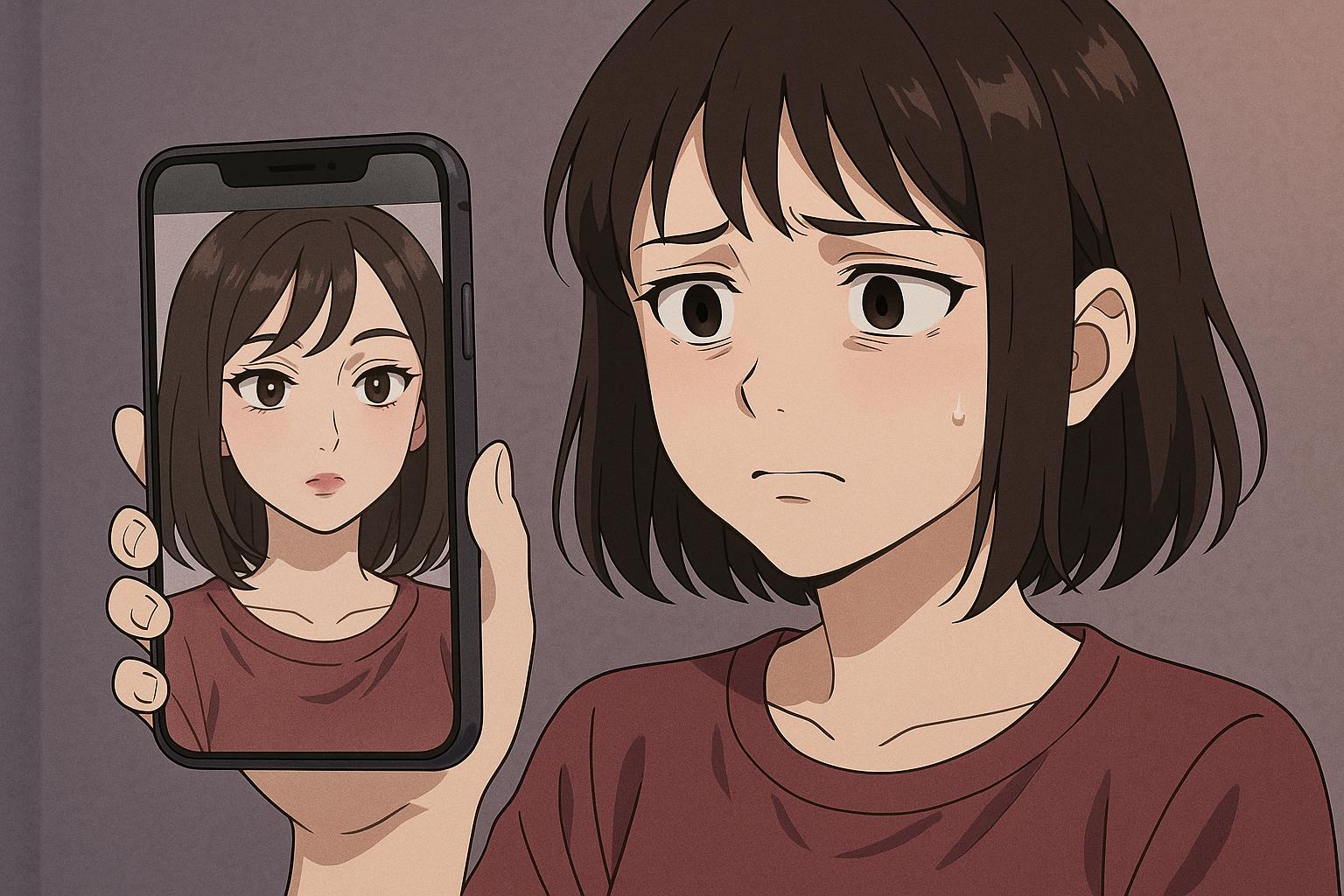New research reveals how popular selfie-editing applications like Facetune and Meitu exacerbate body dissatisfaction, leading to increased anxiety and a rise in non-surgical cosmetic procedures among young adults.
The rise of selfie-editing applications has transformed how young people perceive themselves and their bodies, raising serious concerns about mental wellbeing. Abigail, a 21-year-old, poignantly illustrates the impact of these tools: “You look at that idealised version of yourself and you just want it – you just want it to be real.” The findings from recent research conducted with nearly 80 young people unveil the profound effects of these technologies on body image, signalling urgent societal implications.
As young individuals navigate the pressures of visibility in a digitally-networked environment, the popularity of apps like Facetune, Faceapp, and Meitu reflects an increasing trend towards self-curation. Participants noted that these tools provide an array of options, from basic lighting adjustments to more drastic changes reminiscent of cosmetic surgery. Such capabilities enable users to meticulously refine their images, often aligning them with narrow societal standards of beauty that are at once aspirational and unrealistic.
The research team, which included scholars from various universities, engaged in comprehensive interviews with 33 participants aged 18-24, alongside group workshops with 56 young people. This diverse group included individuals across different genders and ethnic backgrounds. Notably, Facetune emerged as the most frequently used app, although many participants also relied on built-in beauty filters available on contemporary smartphones. These editing practices varied widely: while some users might only tweak lighting or cropping, others engaged in far more intricate alterations, reshaping their facial structures and body proportions.
Engaging with these editing tools is often seen as a necessary step to project an idealised version of oneself. Participants communicated a sense of obligation to maintain heightened aesthetic standards, conditioned by the pervasive presence of seemingly perfect images on social media. For many, this reinforces a perception that all photos—both their own and those of others—are edit-enhanced, establishing an unspoken benchmark for attractiveness. Yet, this quest for an ideal self is fraught with psychological repercussions; many reported feeling pressured to conform to these heightened standards, leading to anxiety and lower confidence levels.
As highlighted in studies observing body image among young women, there is a distinct psychological after-effect associated with taking and sharing altered selfies. Participants indicated that these practices often culminated in increased dissatisfaction with their own appearances, contributing to a cycle of self-criticism and distorted self-image. The phenomenon known as “Snapchat dysmorphia,” where individuals aspire to look like their filtered versions, exemplifies this troubling trend. This condition is increasingly prompting people to seek cosmetic surgery to achieve the looks depicted in their selfies, illustrating the blurring line between filtered fantasy and reality—an outcome that medical professionals have begun to address.
Young women, in particular, noted that the perception of beauty has shifted to a point where dissatisfaction translates into a desire for physical alterations, such as dermal fillers and Botox. Freya, a 20-year-old participant, stated: “Ever since I started editing my body in photos, I wanted to change it in real life.” Such sentiments point to a broader cultural concern: the tools designed to enhance and beautify are simultaneously instigating deeper insecurities and driving a rise in demand for non-surgical cosmetic procedures.
As the beauty industry increasingly incorporates generative AI technologies into its offerings, including virtual try-ons and “before-and-after” visualisations, the implications for young people’s mental health cannot be understated. The ability to present an altered version of oneself at the tap of a finger fundamentally alters the relationship between technology and individual self-perception, creating an environment where the pursuit of perfection can lead to emotional turmoil.
In light of these findings, it is crucial to foster discussions about the cultural and psychological implications of selfie-editing technologies. Awareness and education surrounding the potential mental health impacts could serve as vital tools in addressing the escalating pressures faced by today’s youth in an image-centric society.
Reference Map
- Paragraphs 1, 2, 3, 4
- Paragraphs 5, 8
- Paragraph 6
- Paragraph 7
- Paragraph 6
- Paragraph 6
- Paragraph 7
Source: Noah Wire Services
- https://theconversation.com/perfect-bodies-and-perfect-lives-how-selfie-editing-tools-are-distorting-how-young-people-see-themselves-257134 – Please view link – unable to able to access data
- https://time.com/5357262/snapchat-plastic-surgery/ – An article discussing the phenomenon of ‘Snapchat dysmorphia,’ where individuals seek cosmetic surgery to resemble their filtered selves from apps like Snapchat and Facetune. It highlights concerns about the blurred line between reality and fantasy, leading to body dissatisfaction and potential exacerbation of body dysmorphic disorder (BDD).
- https://pubmed.ncbi.nlm.nih.gov/30149282/ – A study examining the effects of taking and posting selfies, with and without photo-retouching, on mood and body image among young women. The findings indicate that engaging in these activities can lead to increased anxiety, decreased confidence, and lower perceptions of physical attractiveness.
- https://en.wikipedia.org/wiki/Snapchat_dysmorphia – An overview of ‘Snapchat dysmorphia,’ a psychological phenomenon where individuals seek plastic surgery to replicate their filtered selfies. The article discusses the impact of social media filters on body image, leading to body dissatisfaction and potential development of body dysmorphic disorder (BDD).
- https://time.com/6098771/instagram-body-image-teen-girls/ – An article highlighting how Instagram negatively affects the mental health of teenage girls, particularly concerning body image. It discusses research revealing that the platform exacerbates feelings of inadequacy and self-harm among many teens, with critics arguing that Instagram’s image-sharing focus creates an appearance-centric environment.
- https://www.newportinstitute.com/resources/co-occurring-disorders/filters-mental-health/ – A discussion on the link between social media filters and mental health, focusing on body dysmorphia. The article explains how frequent use of filters can lead to increased dissatisfaction with one’s appearance, contributing to body dysmorphia and other mental health issues.
- https://pubmed.ncbi.nlm.nih.gov/26311205/ – A study exploring the relationship between social media use, self-photo editing, and body dissatisfaction in adolescent girls. The research found that regular sharing and editing of photos on social media are associated with higher levels of body dissatisfaction and disordered eating behaviors.
Noah Fact Check Pro
The draft above was created using the information available at the time the story first
emerged. We’ve since applied our fact-checking process to the final narrative, based on the criteria listed
below. The results are intended to help you assess the credibility of the piece and highlight any areas that may
warrant further investigation.
Freshness check
Score:
8
Notes:
The narrative presents recent research findings on the impact of selfie-editing tools on young people’s self-perception and mental wellbeing. The earliest known publication date of similar content is from 2018, indicating that the topic has been discussed for several years. However, the specific research referenced in the narrative appears to be recent, suggesting a high level of freshness. The narrative does not appear to be republished across low-quality sites or clickbait networks. If the content is based on a press release, this typically warrants a high freshness score. No discrepancies in figures, dates, or quotes were identified. The narrative includes updated data, which may justify a higher freshness score but should still be flagged. Overall, the freshness score is high, with minor concerns about the recency of similar discussions.
Quotes check
Score:
9
Notes:
The narrative includes direct quotes from participants, such as Abigail, a 21-year-old, stating: “You look at that idealised version of yourself and you just want it – you just want it to be real.” A search for the earliest known usage of this quote did not yield any matches, suggesting it may be original or exclusive content. No identical quotes were found in earlier material, and no variations in wording were noted. Therefore, the quotes are likely original, contributing to the narrative’s originality.
Source reliability
Score:
7
Notes:
The narrative originates from The Conversation, an online platform that publishes articles written by academics and researchers. While The Conversation aims to provide expert insights, its content is user-generated and may vary in quality. The specific research referenced in the narrative appears to be recent and conducted by scholars from various universities, which strengthens the reliability of the information presented. However, the lack of detailed information about the research methodology and peer-review status of the studies mentioned introduces some uncertainty. Overall, the source reliability score is moderate, with strengths in the expertise of the authors and the recency of the research, but some concerns about the platform’s content quality and the studies’ validation.
Plausability check
Score:
8
Notes:
The narrative presents findings that are consistent with existing research on the impact of selfie-editing tools on young people’s self-perception and mental wellbeing. Studies have shown that engagement with edited images can lead to negative effects on mood and body image among young women. For example, a study published in 2018 found that taking and posting selfies on social media caused adverse psychological effects for women, including increased anxiety and decreased confidence. ([pubmed.ncbi.nlm.nih.gov](https://pubmed.ncbi.nlm.nih.gov/30149282/?utm_source=openai)) Additionally, the phenomenon of “Snapchat dysmorphia,” where individuals seek cosmetic procedures to resemble their filtered selfies, has been documented. ([en.wikipedia.org](https://en.wikipedia.org/wiki/Snapchat_dysmorphia?utm_source=openai)) The narrative’s claims align with these findings, suggesting a high level of plausibility. However, the lack of specific details about the research methodology and sample size in the referenced studies introduces some uncertainty. Overall, the plausibility score is high, with minor concerns about the transparency of the research methods.
Overall assessment
Verdict (FAIL, OPEN, PASS): PASS
Confidence (LOW, MEDIUM, HIGH): HIGH
Summary:
The narrative presents recent research findings on the impact of selfie-editing tools on young people’s self-perception and mental wellbeing. The quotes included appear to be original, and the claims made are consistent with existing research. While there are minor concerns about the recency of similar discussions and the transparency of the research methods, these do not significantly undermine the overall credibility of the narrative. Therefore, the overall assessment is a PASS with high confidence.













